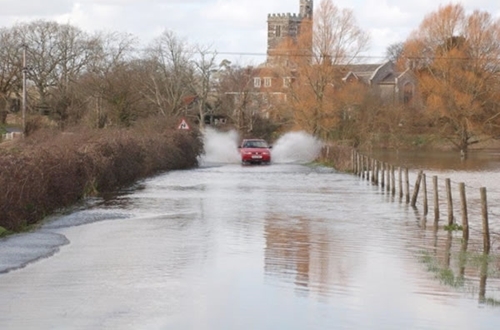This blog post originally appeared on Peter's 'Fresh from the Field' blog on 7th January 2016.

I want to start by saying how my heart goes out to all those who have had their homes flooded – it must be so utterly soul destroying. Listening to their desperate pleas, as they stand in dirty brown sludge surrounded by wrecked furniture, demanding that more money should be spent on better flood defences, is of course a totally justified and understandable demand.
However, and it is a very big “however” in my opinion.
Although these barricades to protect property and people, do of course have a role in flood defence, they are just that – defences. They play no role whatsoever in getting to the bottom of the problem, namely, stopping the floods from occurring in the first place.
Spending large amounts of the flood defence budget on diverting flood waters here and there, seems to me to be the ultimate false economy of going down the “sticking plaster solution”, even though electorally it gets politicians of the hook as they are seen to be doing something tangible.
With all indications from the climate change experts that extremes of weather are going to become far more frequent, surely it is time for a wholesale, radical rethink on this subject.
Writer and biologist Colin Tudge put it across extremely well at the Oxford Real Farming Conference when he said; “We can't control floods - or drought - unless we involve the farmers. The catchment area that picks up the rain is likely to be at least a thousand times larger than the area on which all that water is finally dumped.
So one inch of rain on the surrounding hills becomes 1000 inches – more than 80 feet -- in the river, or in the high street if the river can’t cope”.
That sums up the whole issue in one paragraph in my opinion. This is where the money should be spent Mr. Cameron – on the wider countryside. Cameron might well retort – “OK clever dick, how?”
Well by looking at in-field cultivations systems, alleviating compaction, increasing organic matter in soils, avoiding bare soil over-winter by planting cover crops, holding back water by damming ditches or using sluice gates, creating barriers such as Beetle Banks across sloping fields, pinpointing where water run-off regularly occurs and addressing this by targeting strategic tree planting, whilst also paying farmers to allow flooding on their land rather than sending water on to someone else further downstream.
Take just one of these examples – increasing organic matter in soil, something that all farmers can start to address straight away. Generally, particularly on arable farmland, soil organic matter is fairly impoverished and is often making up only around 1 to 3 % (at best) of the soil’s make-up.
A conservative estimate is that organic matter can hold four times its weight in water, so if a farmer can increase the organic matter in the soil by an additional 1.5%, they could reasonably be expected to hold in the region of another 225 tons of water per hectare, rather than watching it run away into the nearby ditch.
The GWCT’s Allerton project in Leicestershire is providing many answers to the problems that Government now face on this issue. Now is the time to make them part of future soil and water policy.

Get the FREE weekly GWCT newsletter
Get all of Peter's and the GWCT's latest blog updates sent straight to your inbox each Tuesday.
Sign up FREE to the Weekly GWCT Newsletter >